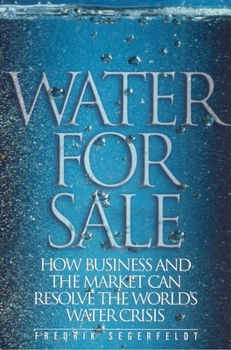Water for Sale: How Business and the Market Can Resolve the World's Water Crisis
Select Format
Select Condition 
Book Overview
This book shows why the protesters are wrong and how more reforms could save the millions of lives and improve the lives of hundred of others.
Format:Paperback
Language:English
ISBN:1930865767
ISBN13:9781930865761
Release Date:June 2005
Publisher:Cato Institute
Length:160 Pages
Weight:0.40 lbs.
Dimensions:0.3" x 5.5" x 8.1"
Related Subjects
Agricultural Sciences Business Business & Investing Conservation Economics Elections & Political Process Engineering Environmental & Natural Resources Law Environmental Economics Law Nature & Ecology Political Advocacy Political Science Politics & Government Politics & Social Sciences Reference Science & MathCustomer Reviews
1 rating
The Poor Can Only Benefit from the Private Provision of Water Supply
Published by Thriftbooks.com User , 15 years ago
[..] Fredrik Segerfeldt originally wrote Water for Sale (2005) in Swedish. The CATO Institute has published an English-language version. So, what does a Swede have to say about the private companies selling water to the world's poor? Privatization is a good idea. Anyone who works on water policy should read this book. Segerfeldt argues sensibly, with examples, statistics and documentation. His arguments echo and reflect recurring themes (equity, poverty, development, capitalism and corruption) in water policy, and this book will be useful (barring miracles in the water sector) for the next 15-20 years. The book is short (118pp plus 25 pp of notes and references) but complete. The prose is clear, with few redundancies, inconsistencies or errors. The book's biggest strength is Segerfeldt's logical foundation (defend the poor). Its biggest weakness is the omission of the bigger picture (how does one do anything well when the government is corrupt?), but we all fail that test at some point. Segerfeldt's brutally-effective condemnation of water policy in the developing world is as dispassionate and rational as one can be when discussing how "every minute of every day, 22 people die because they cannot get enough safe water" (p. 8). Children suffer the most -- accounting for one-quarter of the 12 million annual deaths from water shortage. His main point -- and a good one -- is that the private provision of water by companies seeking profits can hardly make the poor worse off, since "ninety-seven percent of all water distribution in poor countries is managed by public suppliers, who are responsible for more than a billion people being without water" (p. 1). Can we blame Nature for water shortages? No -- the wettest place on earth (Cherrapunji, India) has water shortages due to poor water policies. Although shortages are strongly correlated with a lack of economic development, development is happening too slowly to save lives. Instead, Segerfeldt suggests improving the governance of water supply, and he recommends importing good governance, via private enterprise. Private companies don't just have the advantage of outside cash. They have the advantage of management experience and specialization, the advantage of competitive pressures, and the advantage of the profit motive. Public bureaucracies have none of these advantages. Every locality learns by doing (often repeating mistakes "learned" elsewhere), facing no competition, and catering to political whim. The worst problem is that public bureaucracies suffer no penalty when they deliver poor results. Bureaucratic rewards accrue to those who spend their budgets -- not to those who serve more people. Political forces favor rich urbanites and big farmers, not poor slum dwellers or small farmers. Further, Segerfeldt notes that water is too cheap. Because prices are low, demand exceeds supply and shortages result. Why are prices low? Subsidies of $45 billion per year mean that water prices cover -- o





